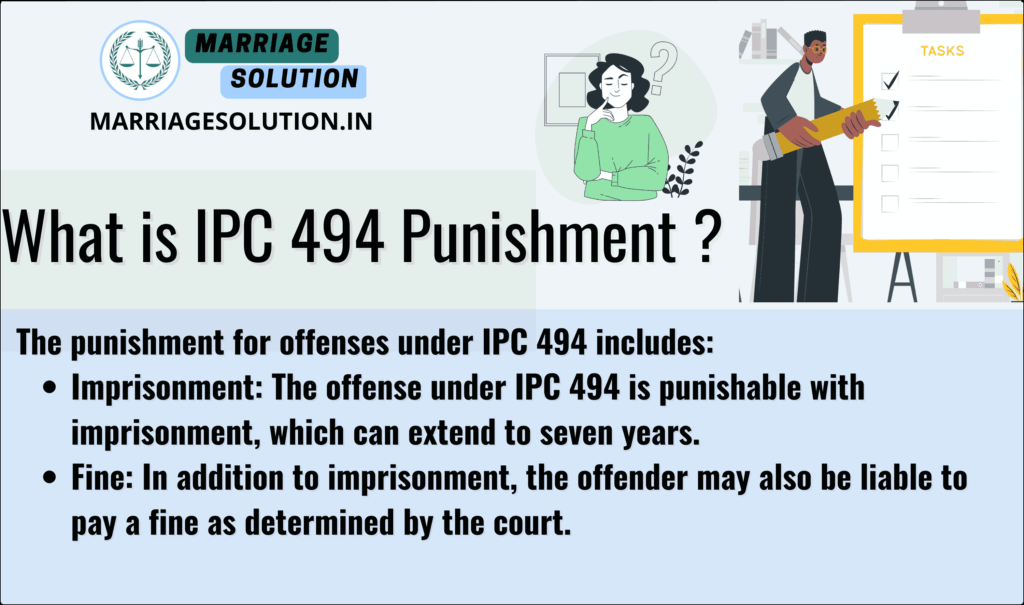Introduction of IPC Section 494
The Indian Penal Code (IPC) is a comprehensive code that covers all substantive aspects of criminal law in India. IPC Section 494 deals with the offense of bigamy, where an individual marries another person while their first spouse is still alive and the marriage has not been legally dissolved. This section aims to prevent and penalize the act of entering into a second marriage without legally ending the first.
What is IPC Section 494 ?
IPC Section 494 criminalizes the act of marrying again during the lifetime of a husband or wife. It ensures that individuals cannot legally marry another person while their first marriage is still valid.

IPC Section 494 Overview
IPC Section 494 criminalizes the act of marrying again during the lifetime of a husband or wife. It ensures that individuals cannot legally marry another person while their first marriage is still valid.
Key Points About IPC Section 494
- Definition of Bigamy:
- IPC Section 494 defines bigamy as marrying another person while already having a living spouse, and the first marriage has not been legally ended.
- Purpose of the Law:
- The primary purpose of IPC Section 494 is to uphold the sanctity and legal status of marriage by preventing individuals from entering into multiple marriages simultaneously.
- Punishment:
- The punishment for committing bigamy under IPC 494 is imprisonment for up to seven years, a fine, or both.
- Bailable or Not:
- IPC 494 is a non-bailable offense, meaning the accused does not have the automatic right to bail and must apply for it in court.
- Nature of the Crime:
- Bigamy under IPC 494 is a cognizable offense, which means the police can arrest the accused without a warrant and start an investigation without the court’s permission.
- Legal Protection:
- This section provides legal protection to spouses by ensuring that their marital rights are not violated by the act of bigamy.
IPC 494 Punishment
- Imprisonment: The offense under IPC 494 is punishable with imprisonment, which can extend to seven years.
- Fine: In addition to imprisonment, the offender may also be liable to pay a fine as determined by the court.

494 IPC bailable or non bailable ?
IPC 494 is a non-bailable offense, meaning the accused does not have the automatic right to bail and must apply for it in court.
Section 494 IPC in short information
| Aspect | Explanation |
|---|---|
| Definition | IPC Section 494 deals with bigamy, which means getting married to someone while already married to another person. |
| Offense | It’s a crime to marry someone else while you’re already married to another person. |
| Punishment | Breaking this law can lead to imprisonment for up to seven years and a fine decided by the court. |
| Bailable | Generally, if someone is accused of bigamy under IPC 494, they can’t easily get out of jail; they need to ask the court for permission to be released on bail. |
494 IPC FAQs
What is IPC Section 494?
IPC Section 494 criminalizes marrying again during the lifetime of a spouse without legally ending the first marriage.
What is the punishment for bigamy under IPC 494?
The punishment includes imprisonment for up to seven years, a fine, or both.
Is IPC Section 494 a bailable offense?
No, IPC 494 is a non-bailable offense.
Can the police arrest without a warrant under IPC Section 494?
Yes, it is a cognizable offense, allowing the police to arrest without a warrant.
What is the primary purpose of IPC Section 494?
The primary purpose is to prevent individuals from entering into a second marriage while their first marriage is still legally valid.
If you need support with court proceedings or any other legal matters, don’t hesitate to reach out for assistance.
Court or any other marriage-related issues, our https://marriagesolution.in/lawyer-help-1/ website may prove helpful. By completing our enquiry form and submitting it online, we can provide customized guidance to navigate through the process effectively. Don’t hesitate to contact us for personalized solutions; we are here to assist you whenever necessary!
